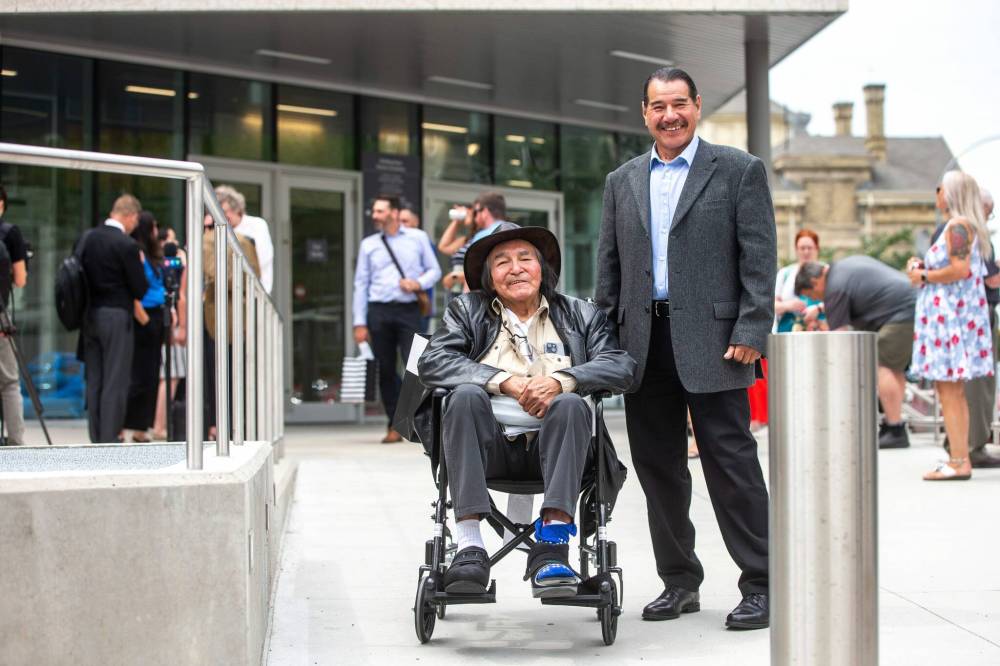The City of Winnipeg and the federal attorney general are asking a Manitoba court to turf lawsuits filed by two First Nations men who were wrongfully convicted of a slaying five decades ago.
The two defendants deny legal liability for the miscarriages of justice.
Allan Woodhouse, 68, and Brian Anderson, 69, members of Pinaymootang First Nation in the Interlake, were formally acquitted in Court of King’s Bench last July on murder charges in the fatal 1973 stabbing of Ting Fong Chan, after Crown prosecutors presented no evidence.

MIKAELA MACKENZIE / FREE PRESS FILE
Allan Woodhouse (left) and Brian Anderson were exonerated by Court of King’s Bench Chief Justice Glenn Joyal, almost 50 years to the day after being charged with the 1973 killing of Ting Fong Chan.
The federal justice minister at the time, David Lametti, had ordered a new trial one month earlier.
The judge said the Winnipeg police investigation, provincial Crown prosecution and verdict were dominated by individual and systemic racism.
Woodhouse and Anderson, who have the same lawyers, including James Lockyer of Innocence Canada, filed separate lawsuits in Court of King’s Bench against Ottawa, the province and the city in April.
In separate statements of defence filed last month, the city and the federal attorney general argue the claims against them should be dismissed, denying that they can be held legally responsible.
The city’s court filings argue the allegations of wrongdoing against Winnipeg police officers were from a time when the legislation governing police did not allow a municipality to be held liable in a civil court for an officer’s wrongful or rights-infringing acts.
The current provincial Police Services Act, enacted in 2009, does allow a municipality to be held liable.
“The City of Winnipeg pleads and relies on such defences and limitations as may have operated at law to the benefit and protection of the police officers at the relevant time,” read the May 9 city statements of defence.
The city also argues the arrest and questioning of Woodhouse and Anderson were reasonable steps in the context of the investigation.
Anderson and Woodhouse claim Winnipeg police officers and George Dangerfield, the provincial Crown attorney who prosecuted the case, colluded to give false evidence during the trial.
Four murder cases prosecuted by Dangerfield were later struck down as wrongful convictions.
The city denied any allegations of a conspiracy and misfeasance of public office in its court papers, among other denials.
It also says the men could take legal action only on any alleged violations of their rights under Canada’s Charter of Rights and Freedoms, which it denies and says would fall on the province, if violations occurred after the charter was entrenched in 1982.
Broadly, the City of Winnipeg says the legal actions against it are barred by the applicable legal limitations from the time of the investigation and should be dismissed with costs.
The city also filed cross-claims against the Manitoba government, seeking indemnity, or an exemption from liability for damages, for any cash the court awards to Woodhouse and Anderson.
“To the extent that the plaintiff has suffered actionable losses… such losses arise wholly and directly, or in the alternative primarily, from the conduct of the prosecution of the plaintiff,” read the city’s claims.
The federal attorney general’s court filings say the Canadian government played no role in the city police investigation of Chan’s slaying or in the provincial prosecutions of the two wrongfully convicted men.
“There was not any action or inaction, breach of duty or breach of a Charter right of the plaintiff, by a servant of Canada for which Canada is vicariously liable,” reads the Department of Justice’s May 23 statements of defence.
Anderson and Woodhouse alleged the federal government failed to ensure they were treated fairly as First Nations men in the justice system and to protect their charter rights.
The federal government says none of its agents breached the men’s charter rights, nor did it have any duty to ensure their rights weren’t breached by others.
The attorney general says it “did not breach any statutory, common law or constitutional duties” to the men and therefore does not owe them damages.
The federal government asked for the court to dismiss the claims against it.
The Manitoba government has yet to respond to the lawsuits.
Anderson and Woodhouse were granted full parole in 1983 and 1990, respectively. They always maintained their innocence.
In 1974, the Manitoba Court of Appeal dismissed their appeal of the murder convictions, which carried life sentences.
In 1975, Anderson was denied leave to appeal to the Supreme Court of Canada.
Anderson and Woodhouse submitted applications for a criminal conviction review in 2019 and 2020, respectively.
Clarence Woodhouse, who was also convicted in the slaying, was granted bail in a Manitoba court last October. His conviction is still being reviewed.
Russell Woodhouse was found guilty of manslaughter and served 10 years. He died in 2011.
erik.pindera@freepress.mb.ca

Erik Pindera
Reporter
Erik Pindera is a reporter for the Free Press, mostly focusing on crime and justice. The born-and-bred Winnipegger attended Red River College Polytechnic, wrote for the community newspaper in Kenora, Ont. and reported on television and radio in Winnipeg before joining the Free Press in 2020. Read more about Erik.
Every piece of reporting Erik produces is reviewed by an editing team before it is posted online or published in print — part of the Free Press‘s tradition, since 1872, of producing reliable independent journalism. Read more about Free Press’s history and mandate, and learn how our newsroom operates.
Our newsroom depends on a growing audience of readers to power our journalism. If you are not a paid reader, please consider becoming a subscriber.
Our newsroom depends on its audience of readers to power our journalism. Thank you for your support.